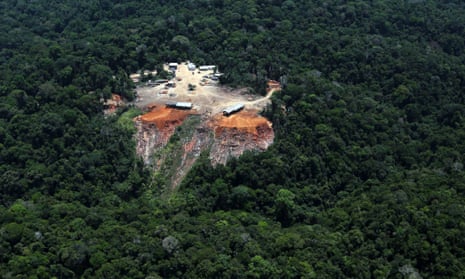The Norwegian government has announced a pledge of 145m kroner (£12m) to help fight forest crime such as illegal tree clearances.
The money will be shared by Interpol, the UN Office on Drugs and Crime and the Rhipto Norwegian Centre for Global Analyses, which collects data on illegal logging. The funds will allow Interpol to expand its dedicated taskforce from six to 15 detectives.
The size of the fund may be small in comparison with the $50 to $150bn-a-year scale of forest crime, but for those trying to maintain the canopies of the Amazon, Congo and Papua New Guinea, the move is one of many steps needed to address a major driver of deforestation.
Forest crime is one of the world’s biggest, but least punished, illegal activities, from land-grabbing syndicates and transborder smuggling rings to corrupt politicians and fraudulent shell companies.
Its impact is global, eroding crucial carbon sinks, natural wealth and ethnic diversity. It contributes to the rising death toll of environmental defenders, who are being killed at the rate of almost four a week. Yet few perpetrators are caught. Some 75% of those arrested are low-level criminals who are given small fines.
The new money will be spent on a taskforce to investigate the international gangs and powerful figures behind them. “We are targeting the kingpins. No longer just truck drivers or people with chainsaws, but corporate entities and higher-level officials. We will also target the profits,” said Davyth Stewart of Interpol’s global forestry programme.
Environmental crimes are increasing by 5-7% per year, twice the rate of economic growth, according to Ola Elvestuen, the Norwegian environment minister. Despite the relatively small sum pledged to counter this, the impact can be large, he said. “It’s important we get this right. If it works, we can scale it up,” he said during the Oslo Tropical Forest Forum.
The world lost more than one football pitch of forest every second in 2017, a new study revealed this week.
The main driver is the often illegal expansion of the agribusiness frontiers of soy, palm oil and other crops. Loggers, farmers and ranchers push into protected areas and indigenous territories, often with the support of corrupt politicians and local police.
To tackle this, the Interpol forestry programme was launched six years ago to coordinate, train and pass on reports to national police forces. It made headlines in 2017 when it worked with law enforcement agents in Brazil, Peru and Mexico to track and seize a shipment of illegal timber bound for the United States on board the Yacu Kallpa.
But the case also highlighted the limitations of Interpol, which has to rely on the cooperation of poorly motivated, under-resourced and often corrupt local authorities. The Yacu Kallpa was held in Mexico for a year, but much of its cargo was eventually released into the market.
Stewart said his team was trying different approaches. If an agency in one country was reluctant to get involved, they would wait until the shipment entered the jurisdiction of a more cooperative nation. If environmental crime carried a low penalty, then they would focus instead on financial misdemeanours such as tax-avoidance and money laundering, which carry heavier penalties. If law enforcement authorities did not think it worthwhile to seize suspect timber, they could be persuaded to inspect it as a possible hiding place for illicit drugs because narco-gangs are often involved in illegal timber trade.

While Interpol does not directly accuse national police forces of taking bribes, they emphasise that “inaction looks like corruption.”
“We are a long way from making a significant impact in terms of reducing lost revenues or regaining control over lost resources,” he acknowledged. “But we have a lot of intelligence, we are starting to identify key targets and with the new funding we can do better criminal analysis and provide strong investigative support.”
Delegates at the Oslo forum, which brings together scientists, forest activists and government officials from the major forest regions of the Amazon, Congo and Papua New Guinea, largely welcomed the extra funds for international law enforcement, but said it would only be effective as part of a wider package of actions, including stronger government policies, better corporate governance and greater consumer awareness.
Oil-rich Norway already provides 40% of the world’s tropical forest funding, spending billions of dollars each year on support for countries such as Brazil that have slowed deforestation over the past decade.
But there are questions about the effectiveness of this approach. Other wealthy nations have not contributed as much as expected and global forest clearance continues at an alarming rate. Norway is committed to this programme until 2030 but there are growing calls to explore other methods.
“Norway has tried to buy policy change and that hasn’t worked”, said Oyvind Eggen, director of Rainforest Foundation, who said more efforts are needed to support change at a political level.
But critics said the extra money for law enforcement was unlikely to make much of a difference in many places and was part of Norway’s efforts to greenwash revenues from the oil industry.
Alexandra Pardal of Global Witness, who has spent the past two years researching a report on deforestation and illegal logging in the Democratic Republic of Congo said that the country – which is home to Africa’s biggest forest – had no effective local police force that Interpol could work with. Rather than helping to fight deforestation, she said Norway was supporting plans to expand industrial logging.
“For us this is a story of Norwegian hypocrisy,” she said.
Norway’s sovereign wealth fund has $143m (£109m) invested in Brazil’s largest beef company, JBS, which is a major Amazon deforester run by two brothers who are now under house arrest due to a political corruption scandal.
Scientists at the forum said urgent action was needed on many more fronts and by many more countries.
